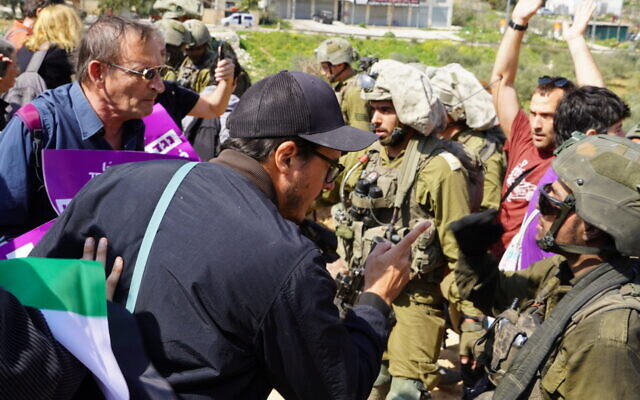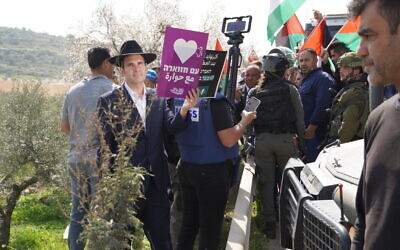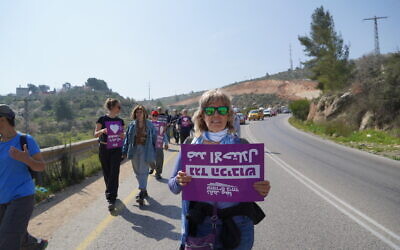Former Knesset speaker joins joint Palestinian-Israeli demonstration in Huwara
Avraham Burg, who was speaker from 1999 to 2003, described the settler riot in the town as a "watershed" moment, causing an unprecedented amount of Israelis to demonstrate in the West Bank.

Former Knesset Speaker Avraham Burg was among some 400 Israeli demonstrators who marched toward the Palestinian town of Huwara last week, in an attempt to show solidity with the victims of what an IDF commander described as “a pogrom” by a mob of violent settlers.
Jewish News was on the ground when the large group of Israelis were forcibly prevented by the Israeli army from entering the town, after declaring the area a closed military zone. Meanwhile Jewish settlers were allowed to enter the town freely.
A number of demonstrators were wrestled to the ground by the army, which threw several stun grenades into the crowd to prevent it from breaking through.
Burg got into a physical confrontation with some of the soldiers after he insisted that he had the right enter the town. “I asked them to see the document that stated it was a military zone but they didn’t. So I kept walking. But you saw how it ended,” Burg told Jewish News.
Former speaker of Israel’s parliament, Avraham Burg, being pushed to the ground by Israeli soldiers after trying to enter the Palestinian town of Huwara to show support for the victims of a pogrom carried out by settlers. pic.twitter.com/1nu2C67TVT
— Jotam Confino (@mrconfino) March 6, 2023
Burg said that army reacted “hysterically” and tried to “overcompensate” for its failure to prevent the pogrom in Huwara from happening a week earlier. “The army became a tool in the hands of political forces,” he added.
As Burg and other demonstrators tried to break through the army blockade, the large crowd behind them began chanting “where were you in Huwara?!” at the soldiers.
????WATCH: Jewish News' @mrconfino reporting from the Palestinian town of #Hawara as Israelis show solidarity with victims of an attack by Jewish rioters described as 'a pogrom' by an IDF commander. pic.twitter.com/XL2Cy7oi89
— Jewish News (@JewishNewsUK) March 3, 2023
The chant, which has also been heard at demonstrations across Israel against the government’s judicial overhaul, is a reference to failure by the army to prevent the pogrom in Huwara from taking place.
Burg, who was the Knesset Speaker from 1999 to 2003, described Huwara as a “watershed” moment, causing an unprecedented amount of Israelis to show up for the demonstration in the West Bank.
“People realise that the ministers who are behind the judicial overhaul are the same ministers who want to ignite Huwara. It’s the same Smotrich, Netanyahu and Ben-Gvir. So people are slowly making the equation,” Burg said.
The mob of some 400 settlers set homes and cars on fire, threw stones at shops in Huwara and killed a Palestinian man in the nearby village of Za’tara in revenge for a Palestinian terrorist attack that killed two Israeli brothers that same day.
The Israeli army, which described the attacks in Huwara as “terror” and a “pogrom”, later took full responsibility for not managing to break up the violent rampage in time, especially since settlers had announced on social media that it would be marching to Huwara to seek revenge.
“Let Huwara burn”
As the demonstrators were scuffling with the army, Palestinian children were cheering from balconies nearby, showing peace signs. Other local Palestinians joined the Israeli protesters, with both sides waving the Palestinian flag.
Israeli protester Jesse Burke told Jewish News that members of the notorious hilltop youth are in his “immediate family” but that he could not remain silent after the atrocities committed in Huwara.

“We cannot practice Judaism without caring for all mankind. The late Rabbi Sacks wrote a whole book called ‘not in God’s name’ which says you shouldn’t kill innocent people,” Burke, 46, from the Israeli city of Beit Shemesh said.
Another protester who clashed verbally with settlers who drove past the rally told Jewish News that the attacks on Huwara made her “ashamed and angry” but that it was “written on the wall.”
“Settler violence in the West Bank in the past two years is increasing but the army isn’t doing anything to stop it so they know they can get away with it,” peace activist Dafne Barnai from Tel Aviv said.

Barnai has also experienced settler violence herself: “About eight years ago, I parked my car at Tapuach Junction, not far from here, when settlers threw a burning newspaper through the window which was left open, setting my care on fire.”
The rare sight of a joint Palestinian-Israeli demonstration was met with fury by settlers driving by. The majority of them were screaming “terrorists” or “traitors” at the Israeli protesters.
Some openly incited to violence, repeating a statement made by Jewish Power party lawmaker Zvika Fogel who said he wanted to see Huwara “burn,” while others repeated Finance Minister Smotrich’s call to “wipe out” Huwara.

Thank you for helping to make Jewish News the leading source of news and opinion for the UK Jewish community. Today we're asking for your invaluable help to continue putting our community first in everything we do.
For as little as £5 a month you can help sustain the vital work we do in celebrating and standing up for Jewish life in Britain.
Jewish News holds our community together and keeps us connected. Like a synagogue, it’s where people turn to feel part of something bigger. It also proudly shows the rest of Britain the vibrancy and rich culture of modern Jewish life.
You can make a quick and easy one-off or monthly contribution of £5, £10, £20 or any other sum you’re comfortable with.
100% of your donation will help us continue celebrating our community, in all its dynamic diversity...
Engaging
Being a community platform means so much more than producing a newspaper and website. One of our proudest roles is media partnering with our invaluable charities to amplify the outstanding work they do to help us all.
Celebrating
There’s no shortage of oys in the world but Jewish News takes every opportunity to celebrate the joys too, through projects like Night of Heroes, 40 Under 40 and other compelling countdowns that make the community kvell with pride.
Pioneering
In the first collaboration between media outlets from different faiths, Jewish News worked with British Muslim TV and Church Times to produce a list of young activists leading the way on interfaith understanding.
Campaigning
Royal Mail issued a stamp honouring Holocaust hero Sir Nicholas Winton after a Jewish News campaign attracted more than 100,000 backers. Jewish Newsalso produces special editions of the paper highlighting pressing issues including mental health and Holocaust remembrance.
Easy access
In an age when news is readily accessible, Jewish News provides high-quality content free online and offline, removing any financial barriers to connecting people.
Voice of our community to wider society
The Jewish News team regularly appears on TV, radio and on the pages of the national press to comment on stories about the Jewish community. Easy access to the paper on the streets of London also means Jewish News provides an invaluable window into the community for the country at large.
We hope you agree all this is worth preserving.





















